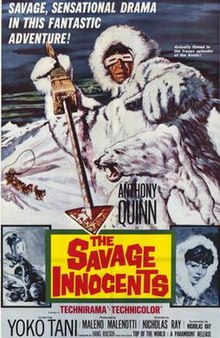The Savage Innocents
| The Savage Innocents | |
|---|---|
 | |
| Directed by | Nicholas Ray |
| Screenplay by | Nicholas Ray Hans Rüesch (adaptation) Franco Solinas (adaptation) |
| Based on | Top of the World by Hans Rüesch |
| Produced by | Maleno Malenotti |
| Starring | Anthony Quinn Yoko Tani |
| Cinematography | Peter Hennessy Aldo Tonti |
| Edited by | Eraldo Da Roma Ralph Kemplen Jolanda Benvenuti |
| Music by | Angelo Francesco Lavagnino |
Production companies | Société Nouvelle Pathé Cinéma (as Gray Film-Pathé) Appia Films Ltd. (as Appia Film) Gray Films Magic Film |
| Distributed by | The Rank Organization (United Kingdom) Paramount Pictures (United States) |
Release date |
|
Running time | 110 minutes |
| Countries | Italy United Kingdom France |
| Language | English |
The Savage Innocents is a 1960 adventure film directed and co-written by Nicholas Ray. Anthony Quinn and Yoko Tani star, with Lee Montague, Marco Guglielmi, Carlo Giustini, Anthony Chinn, and Michael Chow in supporting roles, alongside Peter O' Toole in an early film role. It was adapted from the novel Top of the World by Swiss writer Hans Rüesch.
The film was an international co-production, with British, Italian and French interests involved; in the United States it was released by Paramount Pictures. The film was shot on-location in the Canadian Arctic, with interiors shot in Britain's Pinewood Studios and in Rome's Cinecittà studios. It was entered in the 1960 Cannes Film Festival.[1] The film's themes include Inuit survival in the extreme arctic wilderness, as well as their raw existence and struggle to maintain their lifestyle against encroaching civilization.
Plot
[edit]An Inuk hunter kills a Christian missionary who rejects his traditional offer of food and his wife's company. Pursued by white policemen, the Inuk saves the life of one of them, resulting in a final confrontation in which the surviving cop must decide between his commitment to law enforcement and his gratitude to the Inuk.
Cast
[edit]- Anthony Quinn as Inuk
- Yoko Tani as Asiak
- Nikki van der Zyl as Asiak's voice (uncredited)
- Peter O'Toole as the First Trooper
- Robert Rietti as the First Trooper's voice (uncredited)
- Carlo Giustini as the Second Trooper
- Lee Montague as Ittimargnek
- Marco Guglielmi as the Missionary
- Anna Wong as Hiko
- Kaida Horiuchi as Imina
- Anthony Chinn as Kiddok
- Michael Chow as Undik
- Marie Yang as Powtee
- Andy Ho as Anarvik
- Yvonne Shima as Lulik
- Francis de Wolff as Trader
Reception
[edit]Critical
[edit]Eugene Archer gave the film a mixed review in The New York Times upon its 1961 release: "Most of the qualities that have made Nicholas Ray one of America's most highly praised directors abroad while leaving him relatively unpopular and unknown at home are clearly apparent in 'The Savage Innocents.'" Describing the movie as "badly cut" and "a bitter drama," Archer nonetheless found that "Mr. Ray's highly individualistic preoccupation with moral tensions expresses itself in a series of unusually provocative scenes" and concluded that this "strange, disturbing drama will leave most of its viewers dissatisfied and some outraged, but few will remain indifferent."[2]
Box office
[edit]Kine Weekly called it a "money maker" at the British box office in 1960.[3]
The Mighty Quinn
[edit]Bob Dylan is widely believed to have written the song "Quinn the Eskimo (The Mighty Quinn)" in tribute to Quinn's performance.[4]
References
[edit]- ^ "Festival de Cannes: The Savage Innocents". festival-cannes.com. Retrieved 18 February 2009.
- ^ Archer, Eugene (25 May 1961). "'The Savage Innocents' Is Seen in Neighborhood Theatres". The New York Times. ISSN 0362-4331. Retrieved 24 February 2023.
- ^ Billings, Josh (15 December 1960). "It's Britain 1, 2, 3 again in the 1960 box office stakes". Kine Weekly. p. 9.
- ^ Oliver Trager, Keys to the rain: the definitive Bob Dylan encyclopedia, Billboard Books, 2004, pp. 505–6.
External links
[edit]- 1960 films
- Films directed by Nicholas Ray
- Films scored by Angelo Francesco Lavagnino
- British adventure drama films
- French adventure drama films
- Italian adventure drama films
- English-language French films
- English-language Italian films
- Films about Inuit in Canada
- Paramount Pictures films
- Films shot at Pinewood Studios
- Films shot in Canada
- 1960s English-language films
- 1960s British films
- 1960s Italian films
- 1960s French films
